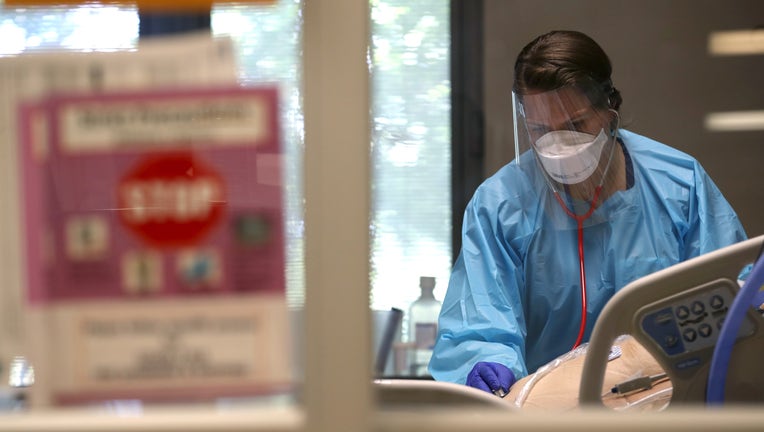Gilroy hospital now filling surge beds as ICU reaches limit, COVID cases soar

FILE PHOTO -- A nurse evaluates a coronavirus COVID-19 patient in the intensive care unit (I.C.U.) at Regional Medical Center on May 21, 2020 in San Jose, California. (Photo by Justin Sullivan/Getty Images)
GILROY, Calif. - A hospital in Gilroy has no ICU beds available and is now leaning on its surge capacity as Santa Clara County leaders highlight disproportionate coronavirus spread amongst Latinx communities.
South county officials made a plea Monday for the public to practice holiday vigilance ahead of New Year's Eve. This, after over the weekend the county recorded its most coronavirus cases since the start of the pandemic. A record 2,000 new infections were reported Saturday, plus an additional 1,600 on Sunday.
As of Monday, there were 29 ICU beds available in all of the county and capacity had dwindled to nine percent. At Saint Louise Regional Hospital in Gilroy, there's not one ICU bed available and they're now filling surge beds.
"If we go beyond the surge capacity, everyone will be affected," hospital executive Gloria de la Merced said in Monday's press conference. "More people in our community will know someone who died or who was seriously ill."
Keep up with the news by downloading KTVU's news app and subscribing to our newsletter
Due to a disproportionate rise in cases among Latinx communities, the virus response update was presented bilingually, with speakers alternating between Spanish and English, a slight change to their common format. Throughout the county, 52 percent of COVID cases are from the Latinx community, while they make up just 25 percent of the population.
"We know that COVID-19 is affecting our Latinx and immigrant communities at a much higher rate in cases and deaths," said Morgan Hill Councilmember Yvonne Martínez Beltrán. "We are worried and must lower our risk."
Depending on someone's job or livelihood, they may be more susceptible to the virus, Gilroy Mayor Marie Blankley noted through a Spanish interpreter. This becomes increasingly dangerous when people ignore public health warnings and gather with friends and family, possibly spreading the virus.
"Once contracted, the gatherings that people then do, whether it’s in your homes or with friends, as innocent as it may seem, causes the virus to spread quickly," Blankley said, pleading with residents in her city and the county to wear masks and respect physical distancing guidance.
READ: Trump signs COVID relief bill granting stimulus checks, jobless benefits
California hospitals have already started delaying elective surgeries. Kaiser postponed them in Northern California until Jan. 4 and to Jan. 10 in Southern California, where new stay-at-home orders are expected in response to maxed out hospitals. For the Bay Area, where critical care units are over 90 percent full, the state won't announce whether the order is lifted or not until Jan. 8.
Health officials anticipate the number of new cases and hospitalizations will rise in the coming weeks following the two holidays, setting up Californians for a grim January as vaccines are still months away from reaching the general public.

